



The day was all watercolour and ink wash, a Scottish mist wrapped wet around us. I was so cold I could barely feel my face and had long lost the use of my hands. But I was happy. Happy to be walking these alleyways, winding our way through this ancient water town with its Ming Dynasty temples and Qing Dynasty post offices, over stone bridges that have arched over jade green canals for hundreds of years, past smoky teahouses and shops selling strings of piping-hot zongzi, triangular packets of rice and meat steamed inside leaves, like a Bengali paturi, which I buy more to warm my hands than to fill my stomach. But mostly I was happy simply to be there.
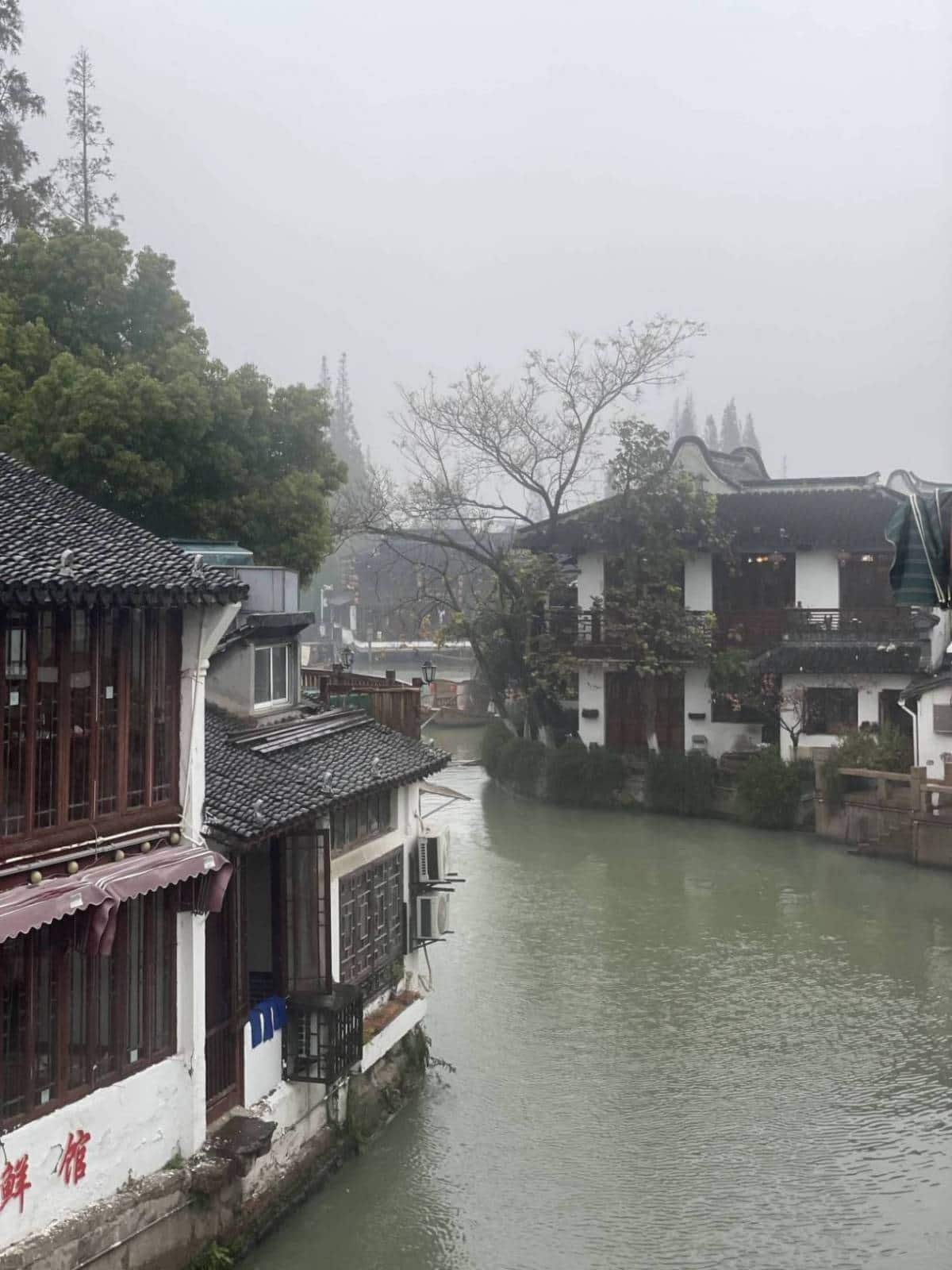 Zhujiajiao water town, 'the Venice of Shanghai', 47 km away from Shanghai, south of the Yangtze river, which has a 1,700-year history. (Photo: Abhijit Dutta)
Zhujiajiao water town, 'the Venice of Shanghai', 47 km away from Shanghai, south of the Yangtze river, which has a 1,700-year history. (Photo: Abhijit Dutta)You see, that week I was still a member of the "five-day club", one of the many odd features of China’s infamous Zero-COVID Strategy. The rules have since changed but till just a month ago, if you left Shanghai and went to another city, upon return you couldn’t enter restaurants, bars, cafés, malls, supermarkets, or any public venues. And although Zhujiajiao, in Shanghai’s Qingpu district, is technically a neighbourhood not a "venue", it is a tourist attraction for its historic sights, and that meant I had to scan a QR code to enter it. If I did, it would immediately identify me as a "less than five days" kind of man, for I had been to Nanjing a couple of days earlier, and I would be denied entry. But rules are rules and then there is reality.
Like in all hustle cultures, the old women of Zhujiajiao had sniffed an opportunity and stationed themselves on the road, offering personae non gratae like me entry through the back lanes, provided we would commit to having lunch at their little home-restaurants; needless to say, a brisk business. Zhujiajiao may be a heritage town but it is where they live and they know more ins and outs than QR codes can block. And so despite the cold and the wet, the drizzle and the mist, the day felt warm and welcome.
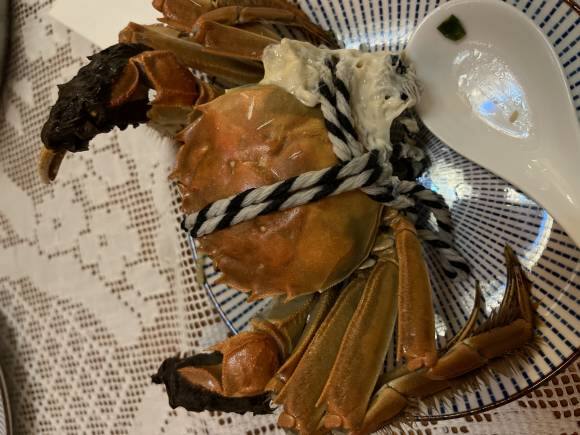 Steamed hairy crab in Shanghai, China. (Photo: Abhijit Dutta)
Steamed hairy crab in Shanghai, China. (Photo: Abhijit Dutta)At lunch, we ate platefuls of steamed greens plucked from their backyards and chewed on pieces of curried eel pulled from the river beside their home. On the way back, we buy a few dozen hairy crabs and take them to a friend’s home to have them steamed. It’s the season and the Shanghainese are as mad about hairy crabs in November and December as Indians are about mangoes in June and July.
We open a pot of huangjiu, yellow wine, as one does while eating hairy crabs, for they are yin and yang, one warms your stomach and the other cools it, and for long, languorous hours, we eat and drink and chat about our lives, and what these past months have been like to live in Shanghai, through the cruel lockdowns and the twilight of ever-shifting normalcy.
At nearly midnight, full of food and friendship, I return to my hotel, ready to drift to a good night’s sleep. It was almost my last day in Shanghai, my flight home was the morning of the day after, and I looked forward to enjoying my last walk about town the next day.
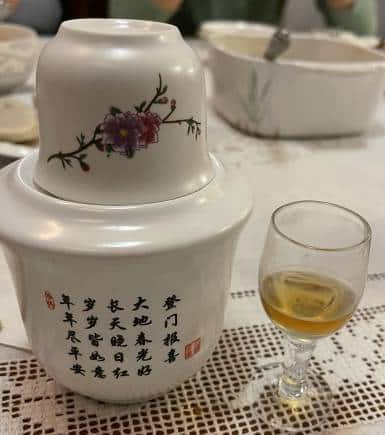 Huangjiu, yellow wine, in Shanghai. (Photo: Abhijit Dutta)
Huangjiu, yellow wine, in Shanghai. (Photo: Abhijit Dutta)But in Zero-COVID China, you can never plan too far ahead, and the next day was a stretch too much. As our car pulled up to the driveway of our hotel, my heart sank. There were police cars and men in trademark hazmat suits. The main entrance was sealed with tape, like a crime scene. I had heard of buildings and places being locked down, I knew friends and colleagues who have been in that situation, but I had somehow managed to block from my mind the possibility that it could happen to me. A lockdown meant either someone in the hotel had tested positive (a catastrophe) or was known to be a close contact of someone who had tested positive, which in turn meant that everybody in the hotel would be treated as close contacts till we all tested negative. That meant that once I went in, I would not be able to leave. No one could leave, not even the hotel staff. For how long? It was anybody’s guess. It could be 24 hours if we were lucky, but it could also be days, even a week or more. I thought of fleeing the hotel but my passport was in my room, and so the decision was made for me.
Once I reached my room, I lay awake, waiting for the test trolley to roll over to my room. I thought about the days gone by, the experience of arriving in China after almost three years, of getting through the drill of quarantine hotels and all the attendant rituals (a whole another story!), and the nearly normal life after. Yes, we had to test every other day, and keep our health code a bright parakeet green, but none of it was very inconvenient and, in general, Shanghai carried on, living the life that was possible. People went to offices to work, to bars and and clubs to make merry, to cafes and restaurants to take selfies. The football world cup played on large screens and big beer drinking crowds gathered to cheer the teams. China is heavily invested in the Qatar FIFA World Cup 2022: majority of the sponsors are Chinese brands and most of the games infrastructure has been built by Chinese companies. The joke is China has everything in Qatar except a football team. Along the Bund, the iconic Shanghai skyline glittered as gloriously as ever, a picture postcard of the prowess of Pudong, the financial nerve centre.
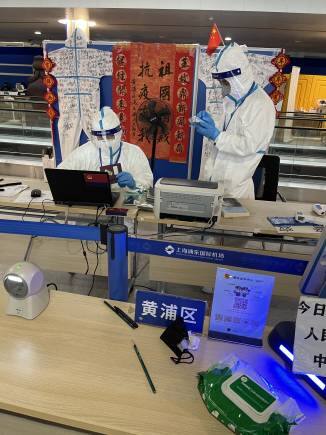 Zero-COVID policy. (Photo: Abhijit Dutta)
Zero-COVID policy. (Photo: Abhijit Dutta)I thought of a conversation I had with a friend earlier in the week, someone who was born and has lived all his life in Shanghai. Feeling a little ragged after my eight days in quarantine and still not fully acclimatised to the new stresses of the city, I say to him that I feel Shanghai is changing.
“Shanghai is always changing,” he says. “That is its nature. Things are constantly happening here, new things are always coming in to the city. That’s Shanghai. Our basic nature is our openness, that is what makes us different. If you leave aside Hong Kong, we are the most open place in China. People from other places think we are spoilt, we are arrogant. They make fun of us for crying about not being free to go to brunch, not being able to get our favourite coffee. Maybe it’s true, maybe we are spoiled, but us Shanghainese are different. But the new leadership in the city are all outsiders, in all the important positions. They don’t care Shanghai is different, the gulf between them and how we feel will keep growing.”
“Are you optimistic?”
“I am not optimistic. But I am not pessimistic. I tell myself it doesn’t matter whether things are good or things are bad. I want only to be a witness. It happened. I was here. In Shanghai.”
The doorbell rings. It’s 3AM. A man in a hazmat suit swabs my mouth. I go to sleep. Next day we are tested a couple more times. We are locked in but we can move within the hotel. In a parody of ourselves, we drink champagne in the lobby restaurant, an extravagant gesture to defy our worries. There is a communal spirit in the air, everyone more prone to be friendly. We ask each other and the staff if they know what was happening.
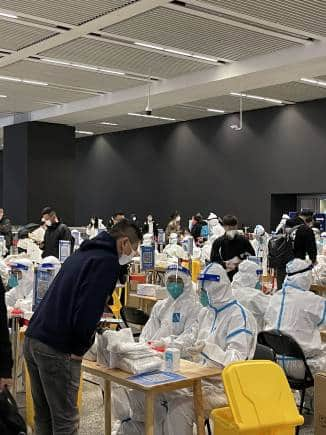 Shanghai lockdown. (Photo: Abhijit Dutta)
Shanghai lockdown. (Photo: Abhijit Dutta)After some wrangling, I get approval to go directly to the airport to catch my flight. I cannot leave the hotel to go the cafe next door but I can leave the country. I pack my bags, I go through the checks at the airport, I return home. The next morning my friends in Shanghai text me that my hotel had now been classified as high risk and the lockdown was extended. By that same evening news arrived that China was easing off its Zero Covid strategy and controls appeared to relax throughout the country. No more restrictions on domestic travel, much less testing, fewer QR codes to be scanned. Chinese stocks leap, the tickers as green as the heath codes that are your ticket to everything in Shanghai. It feels schizophrenic.
No one knows how the next few months will unfold. Will there be a profusion of new deaths? Will China lockdown again? Or will China shrug off its isolation of the last three years and rejoin the global economy, lifting it out of its current gloom? Will people recover from the trauma of daily uncertainty, the constant gaslighting, and regain the confidence and optimism that is the hallmark of Shanghai?
No one can tell, but there will be witnesses.
Discover the latest Business News, Sensex, and Nifty updates. Obtain Personal Finance insights, tax queries, and expert opinions on Moneycontrol or download the Moneycontrol App to stay updated!
Find the best of Al News in one place, specially curated for you every weekend.
Stay on top of the latest tech trends and biggest startup news.